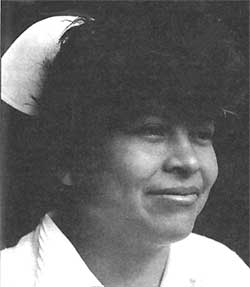 Gudulia Concepción Molina Aguilar
Gudulia Concepción Molina AguilarTwenty-year old Gudulia Concepción Molina Aguilar is from Simojovel de Allende, Chiapas, just down the road from Dr. Santos and el Bosque. Simojovel is about twice the size of El Bosque and a little lower in elevation, so it must be similar, except even more bustling and hotter. Gudulia refers to it as being more civilized but more isolated -- "Way back in a little nook in the mountains," she says. Here's her story:
"My father is a radio technician and my mother works in the house. She also makes bread to sell in the street. I have three brothers and one elder sister. When I was a child at home, I just played. Especially I liked to play marbles, even though that's a game that only boys are supposed to play."
Admitting that once she liked to play marbles, Gudulia looks profoundly ashamed and embarrassed. Her pixy-like face expresses the epitome of innocence. She seems younger than twenty.
"Well, the truth is, hmmmmmm..., Well, maybe at first I wasn't so well educated. I didn't help around the house and sometimes I didn't even pay proper respect to my parents. I wasn't bad all the time; just sometimes. And, well, my father had heard about Yerba Buena -- that here they can prepare you for life, and that they are very strict. For example, here they don't let you eat meat. Yes, strict in many ways, but the truth is that that helps a person a lot. Now that I've been here for several years my parents say that I'm a different person, and it's true. When I graduated from Yerba Buena after two years of study I was well prepared both materially and spiritually."
The moment Gudulia touches on the theme of spirituality, for the first time she takes on an air of confidence. Instantly it becomes clear that this is the topic on which she feels most at ease.
"Before I came here I was a Catholic, but it didn't mean anything to me. Now I'm an Adventist, and I think I'm lucky to have found the religion. For example, my sister stayed in Simojovel and she never changed. She got married very young, had a baby, her husband left her, and now she's hurt, and very unhappy. But I'm here, working, and I'm very content. I work in the hospital. During operations I check blood pressure and apply compresses. But, most important, before the operation I make sure that everything is ready. Also I talk with the patients. I've seen that when you talk to them they don't hurt so much. Of course one problem is that many patients who come here speak only Tzotzil. Generally when they arrive they're dirty. We have to change their clothes and bathe them, but they don't feel comfortable letting us do that and it's hard to explain to them why it has to be done. However, when I was a little girl I wanted to be a social worker, so this part of my job is a little like that, and I don't mind."